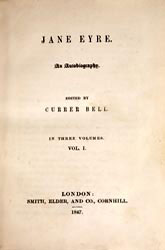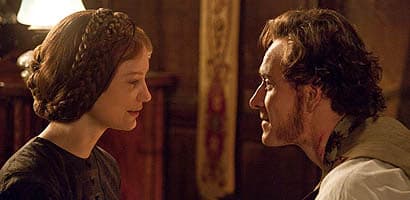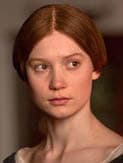Jane Eyre
Critique • Quotes • Text • At the movies
 First edition title page
First edition title pageFirst publication
1847
Literature form
Novel
Genres
Literary, Gothic romance, social criticism
Writing language
English
Author's country
England
Length
Approx. 186,000 words

Michael Fassbender's Rochester is enchanted by Mia Wasikowska's extraordinary Jane Eyre.
All about Jane
Jane Eyre (2011): Film, 120 minutes; director Cary Fukunaga; writer Moira Buffini; featuring Mia Wasikowska, Michael Fassbender, Judi Dench, Jamie Bell
The most recent rendition of Charlotte Brontë's classic (so far) comes courtesy British filmmaking with an international cast. For fans of the novel, it's a brilliant distillation into a two-hour production.
This 2011 Jane Eyre really is about Jane Eyre. The young woman at the centre in the illuminating portrayal by Mia Wasikowska. Although she's close to Jane's age—twenty-one at the time of shooting, I believe—the Australian actress handles the role like a seasoned pro. Better. Naturally fine featured and pretty, Wasikowska somehow comes across on screen as thick and dowdy, but fascinating—someone you want to keep watching.
This is a plain Jane any girl could identify with. Paradoxically, she also has a great appealing and familiar quality that a perceptive man like Mr. Rochester could recognize as his own great discovery. It's a goodness that shines out through the subtle shades of doubt and determination flitting across her face. Mia's is a Mona Lisa face that lets you read much into it but leaves you guessing at further depths.
In short, she's a Jane Eyre that a Mr. Rochester could believably prefer to the aristocratic and conventionally beautiful women who seek him for his wealth and status.
Similarly to Toby Stephens in the 2006 televised series, Michael Fassbender at first appears too handsome for the role as the rough-edged master of Thornfield, but he grows into humanity through his scenes with Jane. By the film's sudden end, the reconciliation of the lovers—him a broken man, her having come through her own travails victoriously—is completely credible.
The story is told from the perspective of Jane's flight from Rochester. When we are introduced to her, she is bedraggled and forlorn on the moors, just before she is taken in by the Rivers sisters and brother. As she is adopted into their enclave, she tells them of her experiences as an orphan child (with 12-year-old Amelia Clarkson as Jane) and as governess at Thornfield. When the story is eventually brought up to date through flashbacks, we get the full treatment of her life with the Rivers, her unexpected inheritance and her psychological summons back to Rochester.
Trailer for 1943's intense adaptation of Jane Eyre appeals to book readers.
Some elision of the novel's material must be expected, though nothing jars in this version. Minor characters are allowed to come into their own. Simon McBurney is a slimy, creepy Brocklehurst, rather than the merely authoritarian schoolmaster of other versions. Jamie Bell is a believable St. John Rivers who expects Jane to become his wife for practical reasons of missionary work. Most importantly, Judi Dench returns Mrs. Fairfax to her central, sympathetic role as a mother figure for Jane.
The only criticism might be that in the interests of realism some gothic aspects have been lightened. Thornfield mansion is a generally bright, airy place with a large staff of servants buzzing about. Warm earth tones predominate both inside and outside in this colour adaptation, as befits the comfortingly wild but sombre environs.
It's a fair trade-off, giving up some of the melodramatic surface darkness for a more credible depth. A modern audience becomes all the more invested in Jane's predicaments and when the breakthroughs come they hit with an emotional wallop.
Charlotte Brontë's nascent feminism rises naturally in this adaptation. Our heroine is never just a put-upon a wimp as in some other films, but neither is she an innately forceful figure who tames the beast of Thornfield. At every turn we see her mentally trying to work her way through every dilemma, weighing her immediate feelings against her wider values, feeling her way through to a conclusion with her integrity intact.
She's an extraordinarily ordinary woman that every viewer can fall in love with.
— Eric


